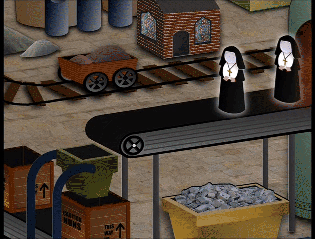It is 1945 and the dark days of the war are finally over. Adolf Hitler's fatal plummet over the Reichenbach Falls has delivered the world from the fiendish machinations of one of the most heinous villains of modern history. With the spectre of armed conflict finally vanquished, the nations of Earth can once more return to a state of peaceful coexistence, cultural intolerance and cold loathing.
Nevertheless...
The war had exacted a terrible toll. Cities lay in ruins, nations were split asunder, and many years of poverty, austerity and hardship lay ahead. In short, it wasn't much fun for the kids - especially those who were keen to listen to the latest beats.
A poor state
The music scene was in a poor state indeed. There were no charts to speak of, MTV hadn't really got going and Robbie Williams had yet to be invented. Even the records themselves were difficult to come by, as most of the available vinyl had been melted down to make aircraft carriers.
The only decent sounds around could be heard in dingy jazz clubs and illegal drinking joints, but these were not the kind of places that teenagers frequented. And quite rightly so. It was a murky underworld of vice and violence; an urban jungle where the only people fit to survive were those with quick wits, sharp eyes and wooden livers.
Spirit of optimism
But that was all to change. The decade was drawing to a close, there was a new spirit of optimism in the air, and society was becoming more affluent and cosmopolitan. The turning point finally came when Chuck Berry, a seventeen year old filter cleaner in an Arkansas pickled onion factory, first picked up a steam-driven guitar and invented the fifties. He promptly teamed up with like-minded farmer's boy, Jerry Lee Lewis, and the two of them set out on the road to rock and roll fame.
That road led them to Vegas, where they soon attracted a following. Before very long, their own particular brand of music had spread like wildfire across the globe.
A-shakin' and a-jivin'
Yes! Rock and roll was born. Everywhere the kids were a-shakin' and a-jivin' in their own skiffle bands, often making their own makeshift instruments out of tea chests, washing machines and abandoned jet engines from Nazi fighter aircraft.
It seemed that with every new week, a new dance craze was born: the twist, the hucklebuck, the popspring and the Hardy reverse shufflestep, to name but those. Everywhere, the kids were getting down and digging it. Those that weren't already in traction, anyway.

The King with his 'Elvismobile', 1972
However, rock and roll was still very much an underground thing, lacking the widespread appeal and mainstream recognition of other popular teenage pastimes, such as building camp fires, volleyball and masturbation. That was all to change with the arrival of one man - Elvis.
Pelvis
Yes, in 1952 Elvis "Pelvis" Presley was a forty-eight year old crooner doing matinees in a Las Vegas casino. When he heard about Chuck and Jerry, he saw the potential in no time. Within the year he had reinvented himself as a 17 year old rockabilly funkster, wowing oldies and youngsters alike with his electrifying performances on top US televisions shows like the Ed Sullivan Show and The News.
He was noted in particular for his shockingly lurid and erotic style of dancing which set teenage girls aflame. In 1953, Congress made it a federal offence for him to appear on television from the waist down, and even as late as 1975, it was still illegal to view Presley's arse without the signed permission of a county judge.
Bad publicity
But, as they say, there's no such thing as bad publicity, and all this attention did Elvis's career no harm at all. Within six months of signing his contract with RCA records, Elvis had eight number one hits - quite a considerable feat when you consider that he only actually released four records in that time.
He was also at the centre of an extremely lucrative merchandising boom, lending his name and image not only to the usual run of posters and books, but also Elvis-themed bathroom fittings, Elvis-themed oven mitts and even his own, personally approved brand of Elvis-themed axle grease.
Rewards and accolades
Not surprisingly, it was around this time that he began to amass a great fortune, and the rewards and accolades just kept coming. When 'Don't Be Cruel' was released in 1956, Elvis was presented with the key to the city of Baltimore. When 'All Shook Up' stormed up the charts the following year, the people of Maryland set fire to a cow in his honour.
And when he scored a number one hit with 'Teddy Bear' he was given Paraguay - a country which is still owned by his estate, and which has become the spiritual homeland to many Elvis fans today.
Scandal
It seemed that everything was going just fine for Elvis, but scandal was lurking just around the corner in the shape of a small church mouse by the name of Colonel Tom Parker. In an interview with a local newspaper in Memphis, Colonel Tom claimed that Elvis couldn't actually sing a note and that he himself was responsible for the distinctive, crooning tones heard on all of Elvis's records.
Apparently they'd had a special plinth installed in the studio so that Colonel Tom could stand level with the microphone. And when Elvis played live, Colonel Tom would cling to his shirt, beneath one of his lapels, belting out his greatest hits and occasionally hissing stage directions as Elvis mimed and concentrated on gyrating his pelvis.
Derision
The story was treated with derision upon its initial publication. This, after all, was the paper that had previously claimed that J Edgar Hoover was made entirely out of papier mâché - a claim which ultimately proved only half correct - and so people were content to take it with a pinch of salt.
However, the story received a very public boost when, at a concert later that very same month, Elvis's voice seemed to dry to a barely audible squeak, forcing organisers to cancel the performance barely a third of the way through. His publicist subsequently claimed that Elvis had succumbed to a particularly nasty cold, which had seriously affected his throat, but it seemed that the damage had been done. There were severe doubts about him now, so Elvis decided to lie low for a while and join the army.

Colonel Tom Parker pictured
at his comeback special in 1968
Hotly debated
And it is at this point that we reach one of the most hotly debated chapters of the King's career. The official story of Elvis's time in the army has it that he spent two years in Germany, during which time he peeled a lot of potatoes, learnt to play the banjo and got to drive an amphibious vehicle a couple of times.
It's all rather mundane, which is why many people have come to doubt this version of events. And they are right to do so, for now at last the true story can be told. Elvis was in fact a voodoo ninja karate expert, working for the CIA behind enemy lines. During 1958 he was dropped in Russia - we're not told how, but some sort of parachute seems to be a likely possibility. Once behind the Iron Curtain he adopted the clever pseudonym 'Elviski' and was thus able to blend in seamlessly with the rest of the populace, sending back coded messages about troop movements and the whereabouts of vodka and furry hats.
A noticeable change
When Elvis finally returned to civilian life many people believed that he had undergone a noticeable change. Some felt his music had lost its edge; others believed that his persona had mellowed. Some felt that his tendency to speak with a slight Russian burr and call everyone 'comrade' all the time lay at the heart of these subtle changes, and there were plenty who were prepared to entertain the notion that he had been switched with a Russian doppelganger.
Whatever the reason, it's true to say that Elvis never recaptured the energy and vigour of his youth. Nevertheless, he became a consummate showman and his regular performances in Vegas were as much about spectacle and pizzazz as they were about music.
Juggling different sized fruits
People would come from all over the world to witness him singing 'Burning Love' whilst juggling different sized fruits and riding a flaming unicycle. And experts were almost universally agreed that his lion taming act was second to none. But sadly, all the circus skills in the world were not enough to save Elvis from a grisly end, and in 1977 he died, fatally, after choking on a toilet.
Elvis was no more, and his fans would forever grieve his passing. The King was dead... Or was he? Maybe, just maybe, Elvis is still out there, using his voodoo cybernetic space karate skills to right wrongs, to protect the innocent and to fight for justice in a world in which one man can rarely make a difference. Today, still wanted by the government, he might just survive as a soldier of fortune. So if you have a problem, if no one else can help, and if you can find him, maybe you can hire... Elvis. Probably.
None of this is true, by the way.
Ricky Stratocaster is now a recovering chocoholic after successfully kicking a thirteen-a-day Mars Bar habit.


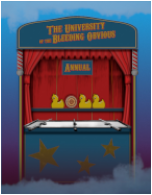








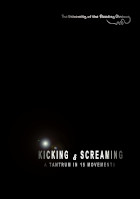









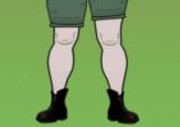 Historic Knees
Historic Knees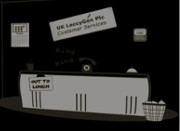 Dirty Electric
Dirty Electric Local Heroes
Local Heroes Stick World
Stick World New Rules for Vampires
New Rules for Vampires The British Gas Party
The British Gas Party Art
Art Why is Water Transparent?
Why is Water Transparent? Digital Ornithology
Digital Ornithology 10 Things You Never Knew About Frogs
10 Things You Never Knew About Frogs